On completing the season of Hajj and Qurbani, one cannot help but hear mention of one particular family who is linked to the Hajj, the city of Makkah Mukarramah and Qurbani. The family of Prophet Ebrahim alaihis salaam is associated with the formation of Makkah Mukarramah, the rebuilding of the Kabah, Mina, Zamzam, Safa and Marwa, Mina and the sacrifice of Qurbani.
We are required to remember this blessed family several times a day in our Salaah. In the last sitting, after Tashahhud, we send blessings on the Prophet sallallahu alaihi wa sallam and his family, and on Prophet Ebrahim alaihis salaam and his family. They achieved such acceptance that even 5,000 years later we know their names and the stories of their lives. Many a person has died less than 100 years ago, yet there is no one to remember them and their graves are even unknown.
Ebrahim alaihis salaam is known as Khaleelullah, or the friend of Allah Ta’ala, like how Prophet Ismail alaihis salaam is known as Zabeehullah, the one who was to be sacrificed for Allah Ta’ala, and Prophet Musa alaihis salaam is known as Kaleemullah, the one who Allah Ta’ala spoke to, and Prophet Muhammad sallallahu alaihi wa sallam is known as Habeebullah, the beloved of Allah Ta’ala. In actual fact, the city where Prophet Ebrahim alaihis salaam is buried in Palestine is called Hebron by the Jewish occupation, whereas in reality it is called Al Khaleel, or the city of the friend of Allah Ta’ala.
Hazrat Ali radhiallahu anhu has mentioned a valuable point regarding the friends of Allah Ta’ala that is relevant to our dealings with people. He says that Allah Ta’ala has kept two things hidden among other things. One is His Pleasure among the good deeds so you don’t know which of the good deeds you do will earn His Pleasure. And He has hidden his friends among the people. We don’t know who is a friend of Allah Ta’ala currently, or who could potentially become a friend of Allah Ta’ala in the future. Therefore we need to treat every person with dignity and respect including our family members, colleagues, the people we interact with on a daily basis for they could be the friends of Allah Ta’ala.
Let us look at some lessons we can take from this special family and implement in our lives to build stronger families. The traditional family unit is under attack from several quarters. We need to strengthen our family units so that the members of that family can be better equipped to deal with the increasing challenges of life.
Satan takes a report back from his underlings. Each one says that he caused certain mischief in the world but Satan is not very impressed. Until one devil comes along and says that he caused a divorce to take place between a husband and wife. Satan gets pleased and praises him. (Muslim) The impact of destroying the marital bond is not only limited to two people – the ripple effects are felt in the extended family and society at large.
Studies such as those of Merz in 2009 show that the family relationship plays a critical role in shaping an individual’s wellbeing across the course of life. Other studies show that marriage between a man and a woman, and the family structure centered around that, is associated with better mental and physical health as opposed to units run by unmarried couples, or same sex partners. It is more likely that kids from a traditional marital family unit will flourish in life. This traditional way of life is fast being eroded.
The first lesson we learn from the family of Prophet Ebrahim alaihis salaam is that there needs to be a family unit in the first place. This family should not just be an association of people under the same roof, or essentially an association of convenience. To make this structure strong requires effort. Further, we learn that the successful family needs one head and this is the father. This makes for a healthy family structure which produces upright, mature individuals, which in turn makes society sound. Western ideology wants us to accept both the father and mother as co-leaders of the family unit. This has time and again proven to be the cause of conflict and frustration.
At the same time, being the head is no license for abuse of that position, or for being inconsiderate or trampling the rights of others. It requires compassion and kindness. A pious person said that the head of the home needs to earn that position by sacrificing his comforts for the wellbeing of his family.
The second lesson we learn is that the head of the home needs to have the correct mindset and vision to guide his family towards ultimate success. This will in turn have an impact on the other members of the family. Prophet Ebrahim alaihis salaam is leaving his wife and young child in a barren land with no visible means of support in compliance with the command of Allah Ta’ala. He makes the following Dua which is preserved in the Noble Quran for humanity to draw lesson from till the Last Day, “Our Lord, I have settled some of my children in a valley of no vegetation, close to Your sanctified House, so that, Our Lord, they may establish Salaah. So, make hearts of people yearn towards them, and provide them with fruits, so that they may be grateful.” (Noble Quran 14:37)
- He prays, “so that, Our Lord, they may establish Salaah.” Here the first priority of the head of the home is to connect himself and the family members to Allah Ta’ala through the most critical aspect of a Muslim’s daily life which is Salaah. In our terms Prophet Ebrahim alaihis salaam is facing a crisis situation, leaving his vulnerable family all alone. We know how stressful this can be especially when our family’s wellbeing and security is at stake. In a crisis we tend to forget everything but that crisis, whether it is the water problem, riots, job loss, etc. Our Dua at such a time tends to revolve only around that crisis. Here Prophet Ebrahim alaihis salaam is focused on the priority of making Salaah the most important thing in his family’s life. Without that daily connection to our Creator in Salaah, how do we even hope to be able to cope with life’s struggles? The world is one of means, but the means can only be effective if the Creator of that means allows it to be effective.
- He then says, “make hearts of people yearn towards them.” The second concern is for his family’s safety and support structure. The head of the home needs to have concern about the type of area he settles his family in, choosing the correct Madressa and school, and so forth. This Dua of Prophet Ebrahim alaihis salaam materialised when a passing tribe saw the Zamzam water source and decided to settle their. The foundation of the city of Makkah Mukarramah was thus laid.
- “Provide them with fruits,” is the next part of Ebrahim alaihis salaam’s Dua. He prays for all their means of survival to be catered for in the form of food, water, clothing, shelter, comfort, etc. The head of the home needs to see to giving his kids a good education, setting up a business, launching a career, and doing what is needed to support his family.
- “So that they may be grateful.” Ebrahim alaihis salaam ends this Dua by outlining the end result of his family getting all their needs seen to: that all this should make them grateful to the One who is providing for them, Allah Ta’ala. They should turn to Him in gratitude, essentially becoming loyal to the One who gave them everything, ready to give their lives to please Him. The priority for the head of the family should be that his family makes Salaah and the commands of Allah Ta’ala the starting point of their success, and they end up as His loyal, devoted servants. Together with this they will do the best they can in terms of living in this world. The head of the home needs to ensure that his mind set is correctly aligned where his first and last concern is the Imaan (faith) of his kids and family members, and how they can be connected to Allah Ta’ala.
The third lesson is that everyone in the family needs to be on the same page if you want to build a strong family unit. When he leaves his family in the empty land, Prophet Ebrahim alaihis sallam’s wife asks him a valid question, “Why are you leaving us here with no visible means of support?” When he did not answer, she rephrased the question and asked, “Is it the command of Allah Ta’ala?” He indicated yes, and she said, “In that case, Allah Ta’ala will not allow us to be destroyed.” When both the spouses are on the same page life becomes easy.
Ebrahim alaihis salaam is given the command to sacrifice his son. The wife is fully supportive in helping her husband carry out the instruction. The child also accepts the command. Life becomes pleasant and the whole family is moving smoothly towards Paradise. Let alone being on the same page, we at times are in totally different books. Obviously to get everyone on the same mind set means that we need to be working towards it. This requires effort such as, a. Taleem in the home where we read about the lives of the Sahaba radhiallahu anhum, about the Prophet sallallahu alaihi wa sallam, about the virtues of good deeds; b. Attending the various Islamic programs in the community; c. Assisting with Masjid and community projects, as examples. Like how the father gets inspired, he needs to expose his family to the things that will inspire and motivate them as well. Bringing alive the Sunnah within then home, and the spirit and passion for Islam will also greatly assist.
The fourth lesson is that when the command to sacrifice his son is given, Ebrahim alaihis salaam asks his son, “O my son, I have seen in a dream that I must sacrifice you, so consider, what is your opinion?” (Noble Quran 37:102) There is absolutely no question that Ebrahim alaihis salaam will comply with the order, and it will be carried out. He is not taking an opinion from his son to decide whether the command should be implemented or not. Rather, this is using a means to take his family members along willingly. The head of the family should not force or he hard and harsh. He is gauging his son’s mind set using wisdom. Depending on the child’s answer he would adapt the response. If the child had doubts, he would dispel them. If he was hesitant, he would prepare his mind. If the family members don’t comply with the instructions to carry out the commands of Allah Ta’ala, don’t throw in the towel, use other methods. In this instance, the child replies, “Do as you have been commanded. I will cooperate.” The boy, Ismail alaihis salaam goes on later on in life to pass this upbringing on to his family and he is praised in the Noble Quran for instructing his family to establish Salaah.
Another aspect we learn is communication within the family unit. The head of the house should not just instruct family members, but engage with them, bonding. Especially in today’s environment, there should be cell-free times to give family members the quality time they need.
The fifth lesson is to make Dua for ourselves and our children to be steadfast on Islam. Ebrahim alaihis salaam prays, “My Lord, make me steadfast on Salaah, and my children.” Here is a great Prophet making this Dua. There is no question of him ever abandoning Salaah. When last have we made Dua for the Imaan and Islam of our kids? We prayed for their success in their exams, for their job interviews, their marriage, but what about praying for them to be punctual on Salaah and becoming connected to the Noble Quran? Ebrahim alaihis salaam prays, “Keep me and my children away from worshipping idols.” (Noble Quran 14:35) The personality who gave his life for the One God is asking to be saved from idol worship! Never rest on your laurels, always pray for the ability to continue with good deeds. With all else that the head of the home does for his wife and kids, he should make Dua for their faith (Imaan) as well.
To build a stable family, the head of the home must have his priorities in order, the correct mind set, aspiring to connect with Allah Ta’ala, making an effort for his family members to be on the same page, taking everyone along with wisdom, communication and bonding, and making Dua for the Islam and Imaan of himself and his family.

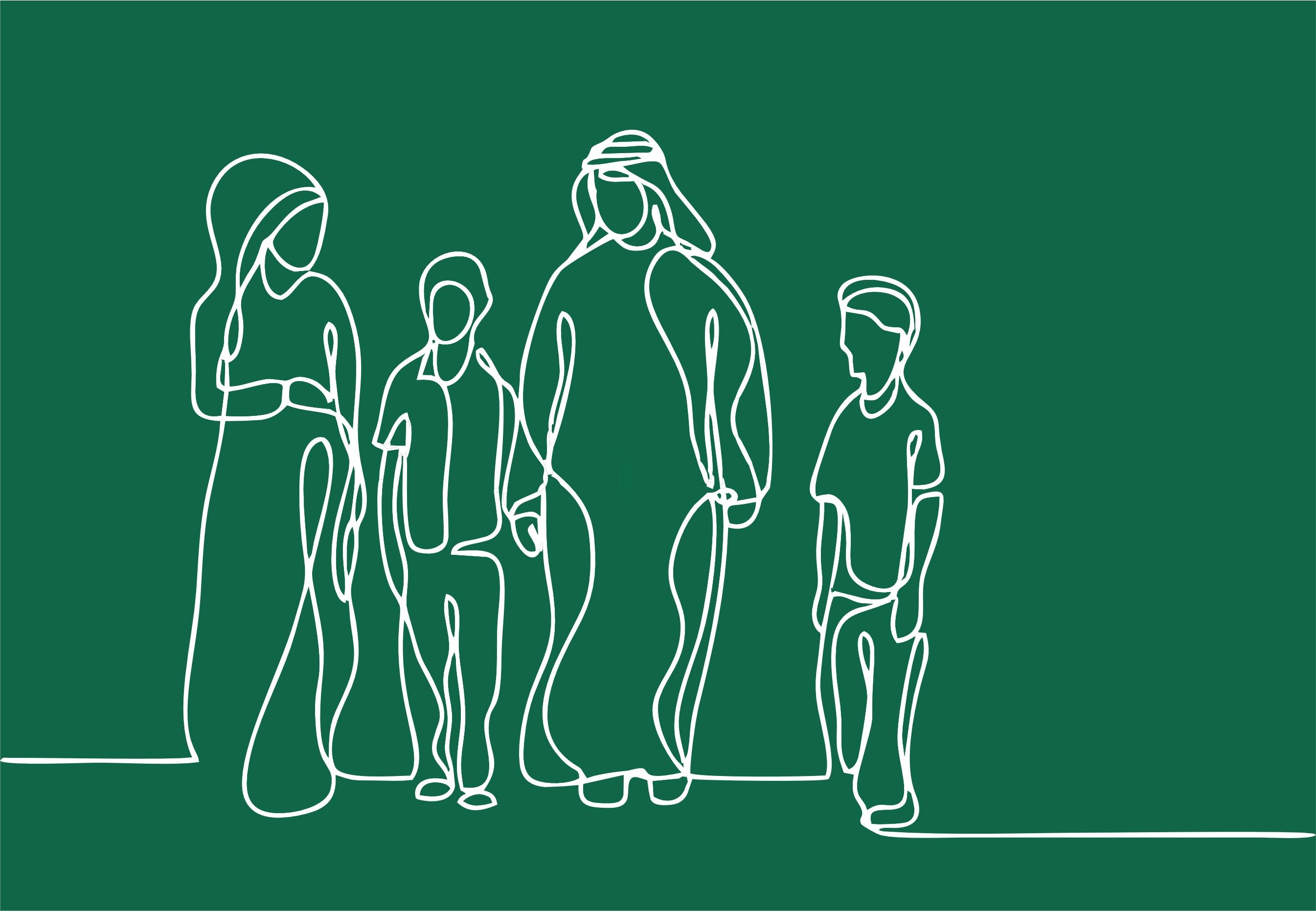
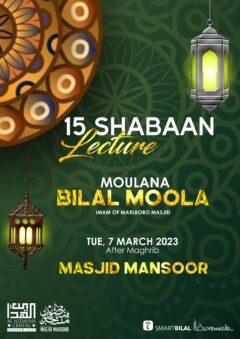

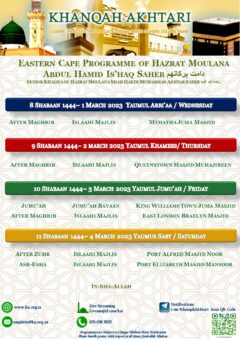
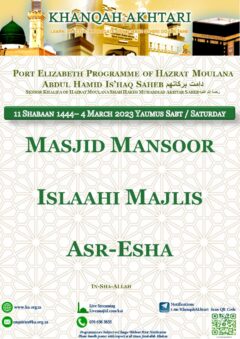

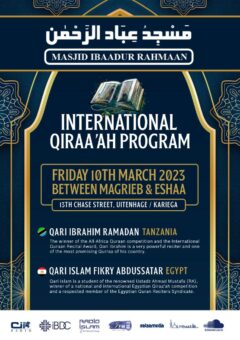



COMMENTS